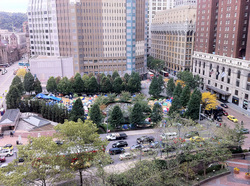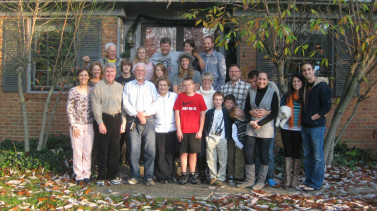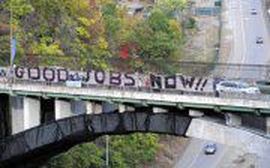
At Transylvania, in college, my eyes began to open a bit. I had some really great professors in sociology and anthropology - I began to read more and to listen. There was a big big world outside of Lexington, KY, with a lot going on, with people who looked and thought and believed differently than my family, my friends, and I did. I stepped out a little - campaigned for McGovern against Nixon. For me, it had become mainly about the war. McGovern lost, of course. And the war. Well, we know what happened there. Promises broken.
Years passed - getting educated, working, having children and making a family, voting, trying to keep up with things. My focus for years was on kids' issues - my own kids, other peoples' kids, working with families, schools, pediatricians, day care centers and preschools.
My focus is still on kids, just in a different way. Julie and Michael are adults, and someday in the not too distant future (no rush, guys - no rush), I may have grandchildren. And this is what I want for my children and my grandchildren:
- a viable and biodiverse earth that can provide clean air and water, and healthy soil to produce abundant food for nourishment for everyone
- equal access to safe shelter, to health care, and to education
- a peaceful world without horrible blood-letting conflict over oil, religion, access to water and land, or my gun's bigger than yours - enough already! enough!
- a culture where there is respect for all workers who contribute to the common good - mothers and fathers who stay at home to raise their children, crossing guards, teachers, nurses, doctors, engineers who build bridges and water systems, farmers, factory workers, safety officers, cooks, landscapers -- you know as well as I do that this list goes on and on
- a well-educated citizenry - a society that selects lawmakers and leaders who will WORK TOGETHER for the common good, that supports a government that is not shaped primarily by corporate interests
I hear criticisms that the movement participants are lazy and entitled and should just get a job - or in Newt's words, "Go get a job after you take a bath." How utterly condescending and hateful and disrespectful. Really? He and his brethren should be heading down to Wall Street and LA and Philly and Pittsburgh and talking to the people who are part of the Occupy Movement - our leaders have the responsibility to talk with and learn from every constituency in this country, regardless of race, economic status, age, ethnicity, political persuasion, job status, education, and so on. How else will they be able to make important decisions for the common good? The reality, however, is that money speaks more loudly to our lawmakers. And people like Newt Gingrich will not humble themselves in order to learn from the mostly young people who are the future of our country. So very sad.
I hear criticisms that the movement's aims are vague and unfocused. Can we truly say that Congress is focused and united? It is true that there are multiple goals of the movement - when I participated in the 10-17-11 Occupy Pittsburgh march, which led to the creation of the camp downtown, I saw many many different groups represented, each with its own story and agenda. But the common thread was the larger story that lives are being negatively affected, in significant long-term ways, by a topsy-turvy world where big companies make laws.
Define plutocracy - Bill Moyers himself, a man of intellect, faith, and integrity speaks out about this. Or, as environmentalist Robert Kennedy, Jr. has said, consider fascism or government by business. Yes, this is very harsh. But please let's really think about the ramifications of the 2010 Citizens United v. Federal Election Commission for our democracy.
There has been much written about Generation Y - my children's generation, the kids of the boomers. A common refrain is that this Generation Y is selfish and narcissistic. Check out this book as just one example of this allegation -- Generation Me: Why Today's Young Americans Are More Confident, Assertive, Entitled--and More Miserable Than Ever Before. Note: if this is true, they didn't get this way on their own.
I am leaping with joy to see young people take a stand for concerns that are larger than themselves, that are related to the health and well-being of all citizens. It makes me happy to go downtown and see the orderly tents of the Occupy Pittsburghers. It makes me happy when my own kids and nieces and nephews ask questions and make comments about the movement, whether or not they agree with me. It makes me happy when I hear my students talk about what this all means. Because it means that they are at least partially attending to what is going on. They are thinking and questioning.
I just finished two very good books about social change and social movements - Martin Luther King's Why We Can't Wait, his writings about the civil rights movements in Birmingham, Alabama in 1963, and Grace Lee Boggs' The Next American Revolution: Sustainable Activism for the Twenty-First Century - she has been involved in civil rights, labor, and environmental work in the Detroit area for decades. What I heard from these wise activists confirmed what I already knew from my work with families and individuals: Change is hard, and resistance to change is intense.
Social change is hard and it is scary. It threatens our familiar assumptions and routines. Both King and Boggs emphasized that rebellion and revolt are not sufficient to produce long-lasting change - toppling the king from the throne does nothing good if you do not have something else to put in place. And they also emphasized that long-lasting constructive social change requires pushing against unfair and unjust practices, in persistent non-violent ways, AND - I find this SO important - stretching ourselves internally, as individuals, to grow and learn and become more fair and just and kind and generous and loving.
Please take the time to read many different accounts of the Occupy Movement, from all sides. Take the time to talk with people who are walking the talk - go downtown in your city and talk to people at the camp (if they are still there). Hear what they are about. Think about what they - and we - can do to keep the conversations and activism and change processes going even as the camps are being demolished. Take it seriously. Eyes wide open, connected, and clued-in.





 RSS Feed
RSS Feed
